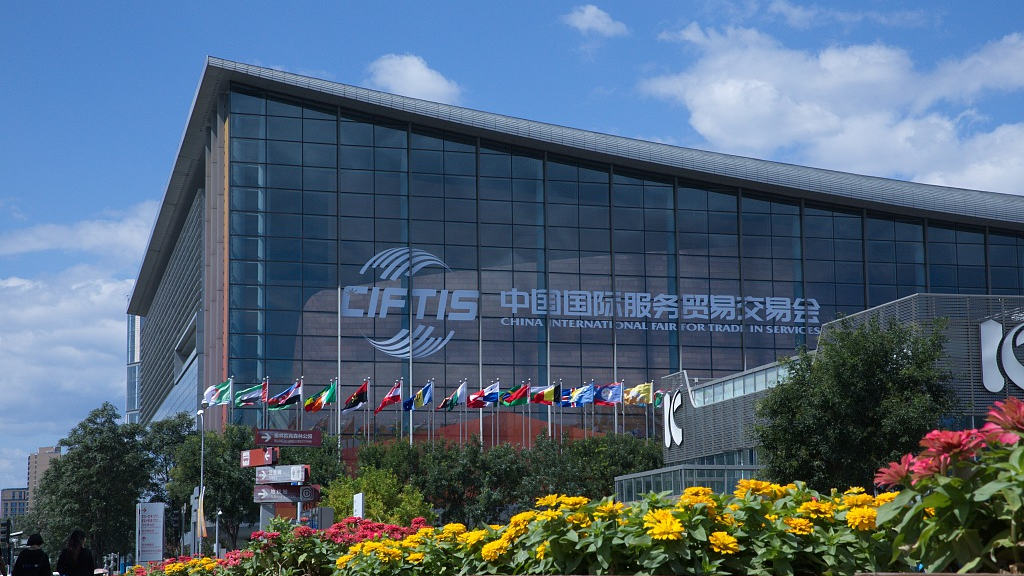
Editor's note: Xiao Huilin is the vice dean of the School of International Development and Cooperation at the University of International Business and Economics and deputy secretary-general of the China Association of International Trade in the Ministry of Commerce. The article reflects the author's opinions and not necessarily the views of CGTN.
In recent years, anti-globalization and trade protectionism have increased the risks of world economic development. COVID-19 has made the world economy worse, causing the world economy to decline.
Among them, service trade has been more severely affected by the pandemic, so promoting the development of service trade has become a key link in the recovery of the world economy. The China International Fair for Trade in Services (CIFTIS), held from September 4-9 in Beijing, is just the one to fill the gap, aiming to promote the development of trade in services and help the recovery of the world economy under the haze of the pandemic.
With the rapid development of global service trade in recent years, CIFTIS has become a new driving force for world economic growth, and played an increasingly important role in the modern world.
First of all, CIFTIS can adapt to the trend that the role of new consumption has increased significantly. This conference launched a forum under the theme "Digital Creative Industry Gives New Impetus to Global Economic Development." The digital creative industry has been incorporated into the national strategic emerging industry plan. The country has newly added digital creative industries in key industries, including digital cultural creative equipment, digital cultural content, design services, etc.
Compared with industry and hard power, this is a layout that focuses on increasing soft power. At the same time, the digital creative industry has the characteristics of high value-added, low energy consumption and low pollution, which is also in line with the positioning of strategic emerging industries.
The consensus among foreign countries in the fair on the development of service trade and digital development has promoted the prosperity of the international service trade market, and has played an important role in further promoting China's digital transformation and upgrading and achieving greater economic development achievements in opening up.
The second is to promote global economic recovery and reflect the responsibility of China as a major power. Affected by the pandemic, the global economic development situation is quite severe, and China has taken the lead in getting out of the economic development dilemma.
In the second quarter of 2020, China's economy showed positive growth, while other countries had negative growth. When the world economic situation was depressed, China did not choose to be selfish, but to embody its responsibility as a major power and work together to promote global economic recovery and the development and prosperity of service trade. Through the launch of CIFTIS, China will join hands with other countries to overcome difficulties.

The National Convention Center, the venue for this year's China International Fair for Trade in Services (CIFTIS) in Beijing, China, September 3, 2020. /VCG
The National Convention Center, the venue for this year's China International Fair for Trade in Services (CIFTIS) in Beijing, China, September 3, 2020. /VCG
The third is to unswervingly promote the progress of globalization and resolutely fight against trade bullying. The rise of global conservatism and anti-globalization have affected the world's "globalization" process. At this special moment, China did not adopt conservatism, and did not forget its original intention, unswervingly expand its opening up, and continue to promote globalization.
Economic globalization is the engine that promotes the growth of the world economy. The progress of globalization is the general trend. The holding of CIFTIS will not only help China to promote the coordinated development of import and export, trade in goods and services, but also help accelerate the formation of the "Double Circulation" model.
Fourth, trade in services is ascendant, and China's economy is booming. During the global pandemic, services such as telemedicine, online education, sharing platforms, collaborative office, and cross-border e-commerce were widely used. Compared with the goods trade of "paying with one hand and delivering the goods with one hand," the trade of services, which uses services as commodities, is a new and advanced form of consumption.
When sending a congratulatory letter to the Global Trade in Services Summit last year, President Xi Jinping pointed out that service trade has increasingly become an important part of international trade and an important area of economic and trade cooperation between countries, injecting new momentum into world economic growth.
Looking ahead, there are directions where service trade can head, so as to further develop trade globalization.
First, with the power of the digital economy, the pace of development of service-oriented manufacturing and the manufacturing-oriented service industry will be accelerated. It should be noted that the service industry will profoundly affect the future development pattern of the manufacturing industry, and the digital economy will help China become a digital power as soon as possible.
With the help of digital technology to break the boundary between manufacturing and service industries, we can accelerate China's supply-side structural reform and demand-side reform, smooth the domestic cycle, and promote the development of international and external cycles.
And we need to develop the digital creative industry, which is an important part of the global digital economy, and where China has large creative economic market potential. We can use the huge consumer market of the Belt and Road Initiative to export the high-quality digital cultural and creative content of our country to this potential market.
In addition, it is necessary to carry out technological innovation in the digital creative industry, update equipment, and create a healthy and sound international ecosystem of digital creative industries.
Furthermore, an open and inclusive environment for cooperation is needed. As the tertiary industry, the service industry has the characteristics of light assets and soft elements. During its development, it needs an open, inclusive, equal and transparent cooperation environment. In the process of development, countries need to reduce barriers to the flow of elements and promote cross-border interconnection.
Last but not least, building a mutually beneficial and win-win cooperation situation is also important. Under the background of economic globalization, the economies of all countries are interdependent, and the integration of interests has never been seen before.
Setting up a fundamental plan to treat each other sincerely and sharing benefits inclusively, countries should strengthen the integration of service trade development, actively seek to maximize the benefits of development, and continue to enlarge the "cake" for everyone.
(If you want to contribute and have specific expertise, please contact us at opinions@cgtn.com.)